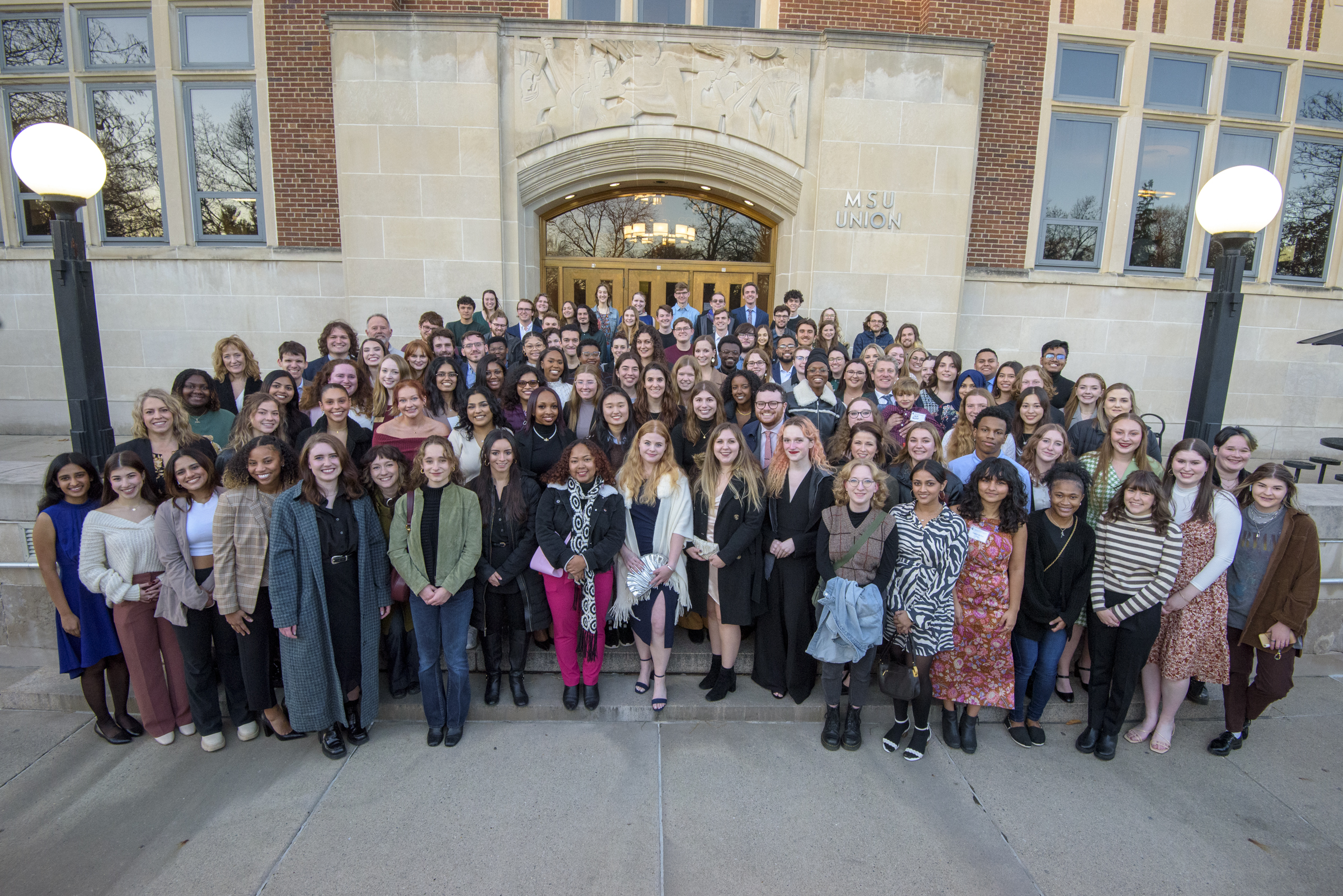January 2024
Updates from the Scholars Team
From the Director
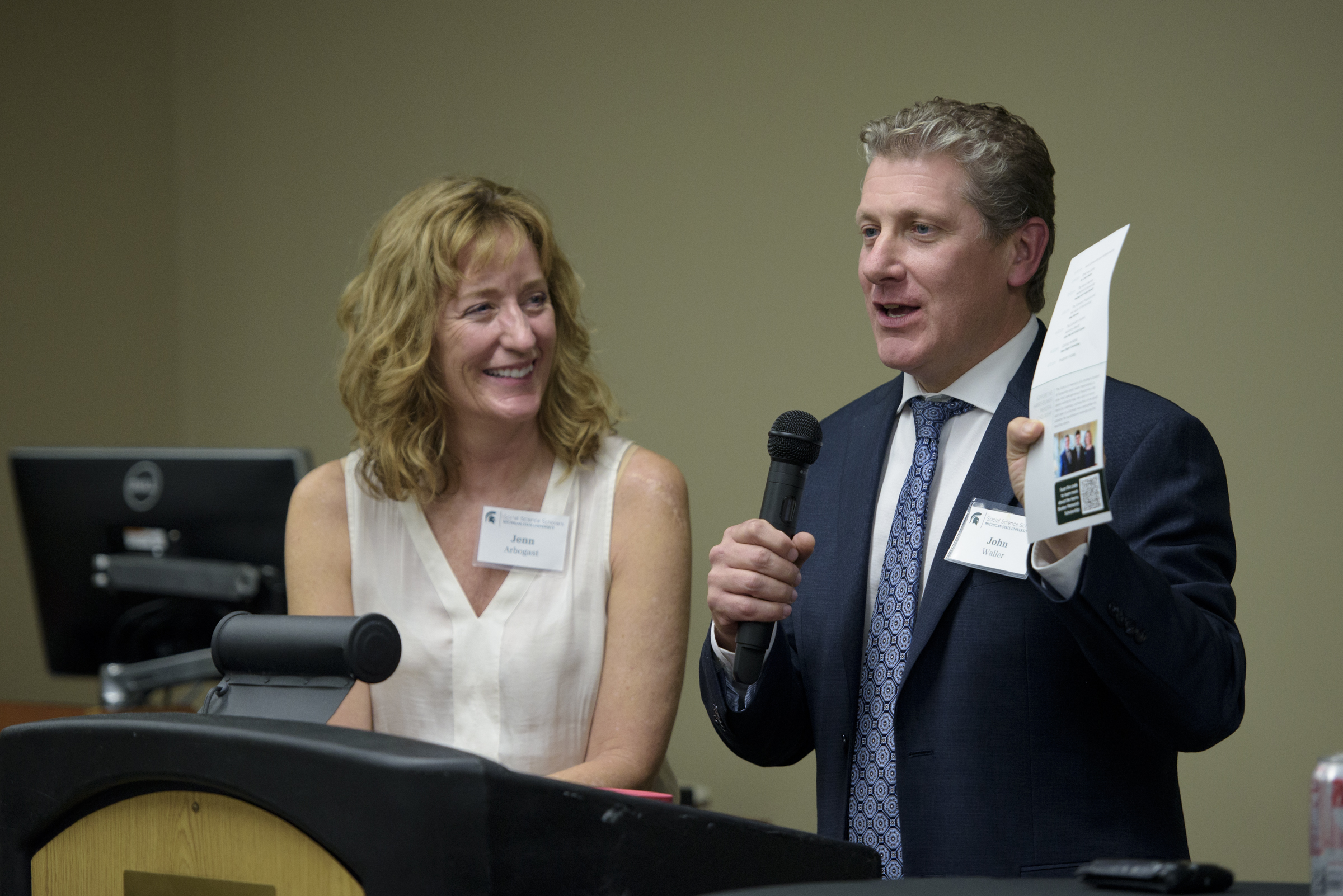
Just over ten years ago the Social Science Scholars Program came into existence. In the spring of 2013, Jenn Arbogast and I stepped into a spare room in Berkey Hall and set about trying to design an academic program that would be rigorous, diverse, and supportive while preparing students for life after graduating. The road’s been occasionally bumpy (expecting two essays a week at first was a bit much!) and Jenn and I had to learn a lot in order to help students navigate the challenges of college life. But I am pleased beyond measure that Jenn and I took the decision to embark on a very unconventional academic path. There has been such an abundance of satisfaction in working with the people who have made this program possible. I’ve been deeply fortunate in the staff, faculty, and teaching assistants who co-created this initiative: Jenn, Samyuktha Iyer, Heather McCauley, Melissa Fore, Brendan Mullan, Mickey Stamm, Carolyn Pratt, McKayla Sluga, and Lauren Muñoz. It’s also been a delight to work with a long list of alumni who have informed what we do and supported our students financially, academically, and personally. And the program could not have asked for better support from the college’s Development Office, led first by Nick McLaren and then Alex Tripp, and the college’s administrative team.
Above all else, it has been a thrill to see over 100 students pass through the Scholars Program, gaining in maturity, confidence, and drive, and going on to find professional and personal fulfilment. Directing an initiative like the Scholars Program is not for everyone; in fact, the typical incentives of academia run counter to any activity that prioritizes teaching and mentorship over research. But I cannot overstate how personally satisfying it has been to employ what talents I have to promote the success and wellbeing of so many intelligent and socially conscious students. I feel extraordinarily lucky to have been given this role. I can’t imagine a better job.
And, after a decade, the Scholars Program is as strong as ever. We have just invited to campus our tenth and most ethnically and racially diverse cohort: a group of 25 students who hail from Michigan, Kentucky, Maryland, Ohio, California, and Dhaka in Bangladesh. We interviewed nearly 70 students for these slots and had to make some very tough decisions. Two-thirds of the way into the fall semester, we could not be happier with the caliber of the students or of the way in which they have forged a sense of community.
It’s with real excitement that we look forward to another decade of the Scholars Program, and of a continued relationship with the college’s alumni and graduates of the program. For now, I hope you’ll linger a short while longer to read about some stand-out achievements of our current Scholars, about the remarkable success of two Scholars in the nationwide Fed Challenge, about four of our Scholars in Africa last summer, about two of our marvellous and dedicated alumni, about the Scholars Program’s community garden, and about two of our finest Scholar alumni.
In closing, I would like to remind you one of our core funding priorities: the Harris Bunker Memorial Scholarship. This scholarship will honor Harris Bunker, a very special young man and former Scholar, who tragically passed away in 2021 of a rare disease. Each year we hope to award it to a mathematically-gifted Scholar who is in financial need and who can help other Scholars develop their quantitative skills. Always generous with his time and his intellectual passions, this memorial scholarship will be a fitting tribute to Harris.
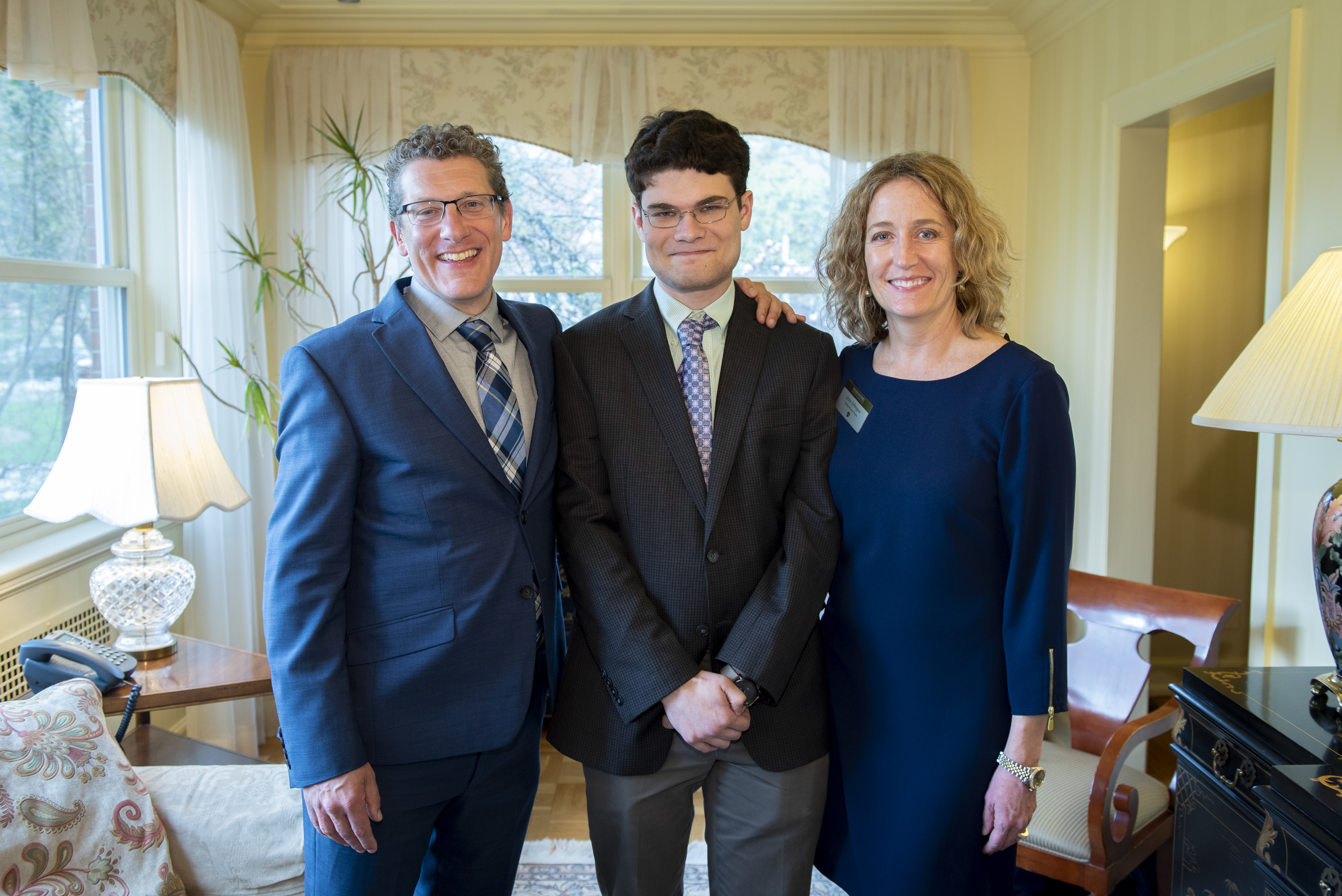
Photo by Jackie Hawthorne of Harris Bunker, John, and Jenn.
Scholars Highlights
Of a long list of notable successes from the last few months, here is a selection:
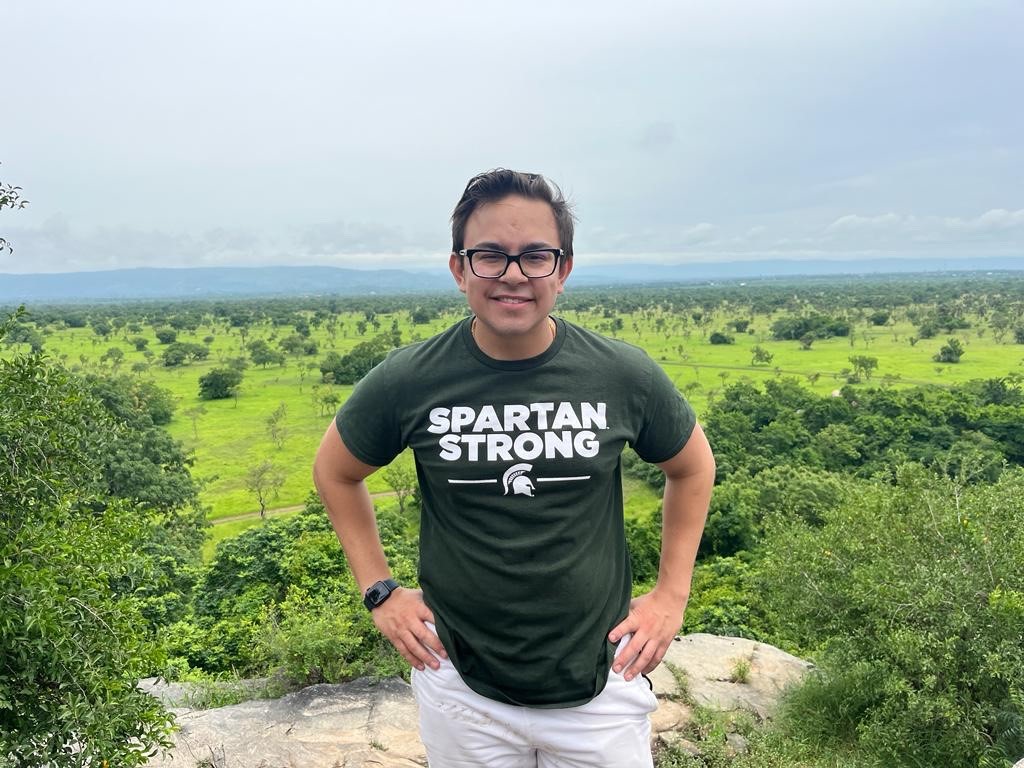
Brennan Haugen during his study abroad trip to Ghana in summer 2023
Brennan Haugen, a fourth year Scholar who majors in Human Biology and Psychology, was nominated by the university for the Mitchell, Marshall, and Rhodes scholarships, three of the world’s most competitive graduate scholarships. Brennan wishes to study public health and health policy either in Northern Ireland or at Oxford University. MSU’s nomination is a well-earned accolade. Brennan has not only participated in the stellar RADD Lab (Research in Autism and Developmental Disabilities), but he has conducted HIV testing in Detroit, studied child health in Ghana, and created his very own non-profit in East Lansing which organizes social events for children with severe disabilities and their families. Brennan plans to devote his career to improving the lives of children with disabilities in a country like Ghana.
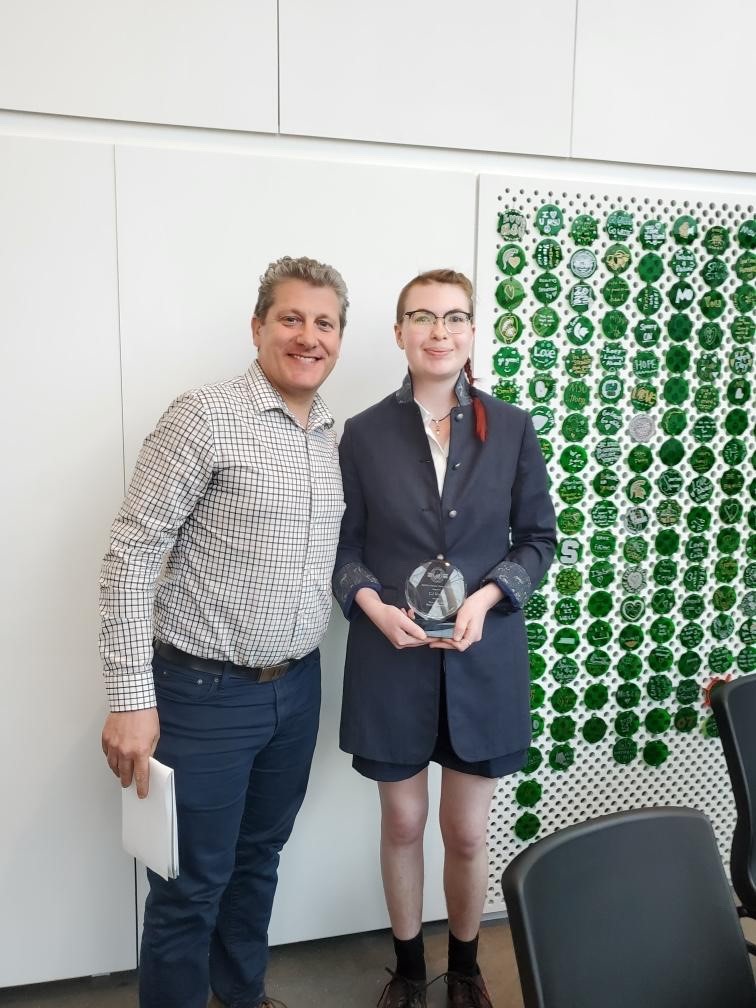
CJ Sivak winning the university’s top award for an undergraduate researcher in spring 2023
CJ Sivak, a 2023 graduate of the Scholars Program who majored in Urban and Regional Planning and Linguistics, was nominated by the university for a Marshall Scholarship. Already the recipient of the university’s award for the finest undergraduate researcher in their year, CJ has excelled in studying how we can enhance human wellbeing by redesigning our built environments. Incredibly, as a sophomore (!), CJ was the lead author on a professional journal article. Since then, they have become ever more accomplished as a researcher and as an intern for Michigan planning departments. If they win a Marshall, CJ will be off to Glasgow in Scotland to study city planning. They are destined to be a major player in this field.
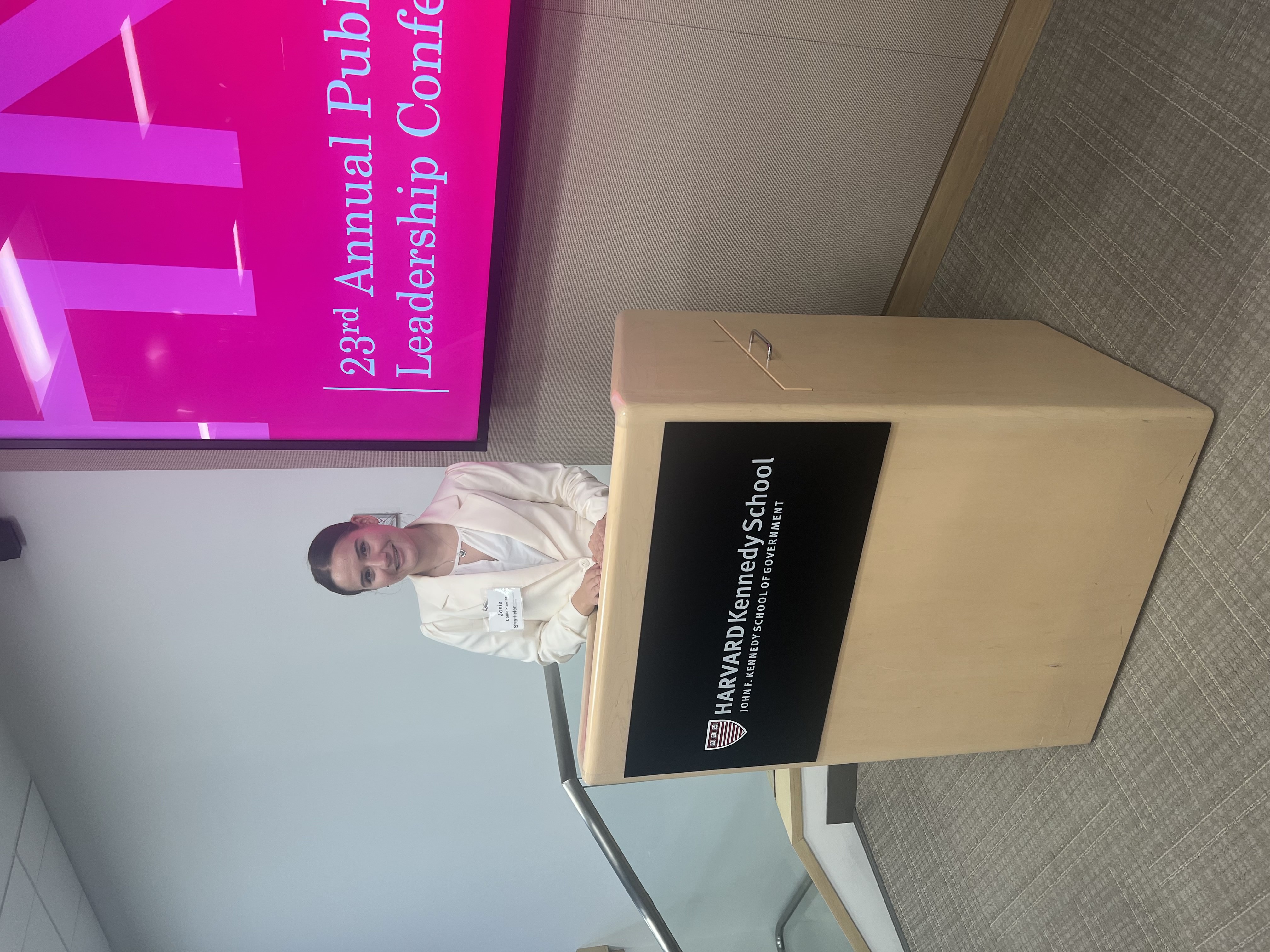
Josie Danielkiewicz speaking at The Public Policy Leadership Conference at Harvard University
Josie Danielkiewicz, a Political Science major who spent the summer interning in Washington with Senator Stabenow, has just returned from The Public Policy Leadership Conference at Harvard University, a three-day event for future leaders. After a fiercely competitive application procedure, during which 60 students were selected from 800 applicants, Josie met with leading public servants and policy makers as well as faculty of the Harvard Kennedy School. For a wise and humane policy-maker to be, this was a superb opportunity.
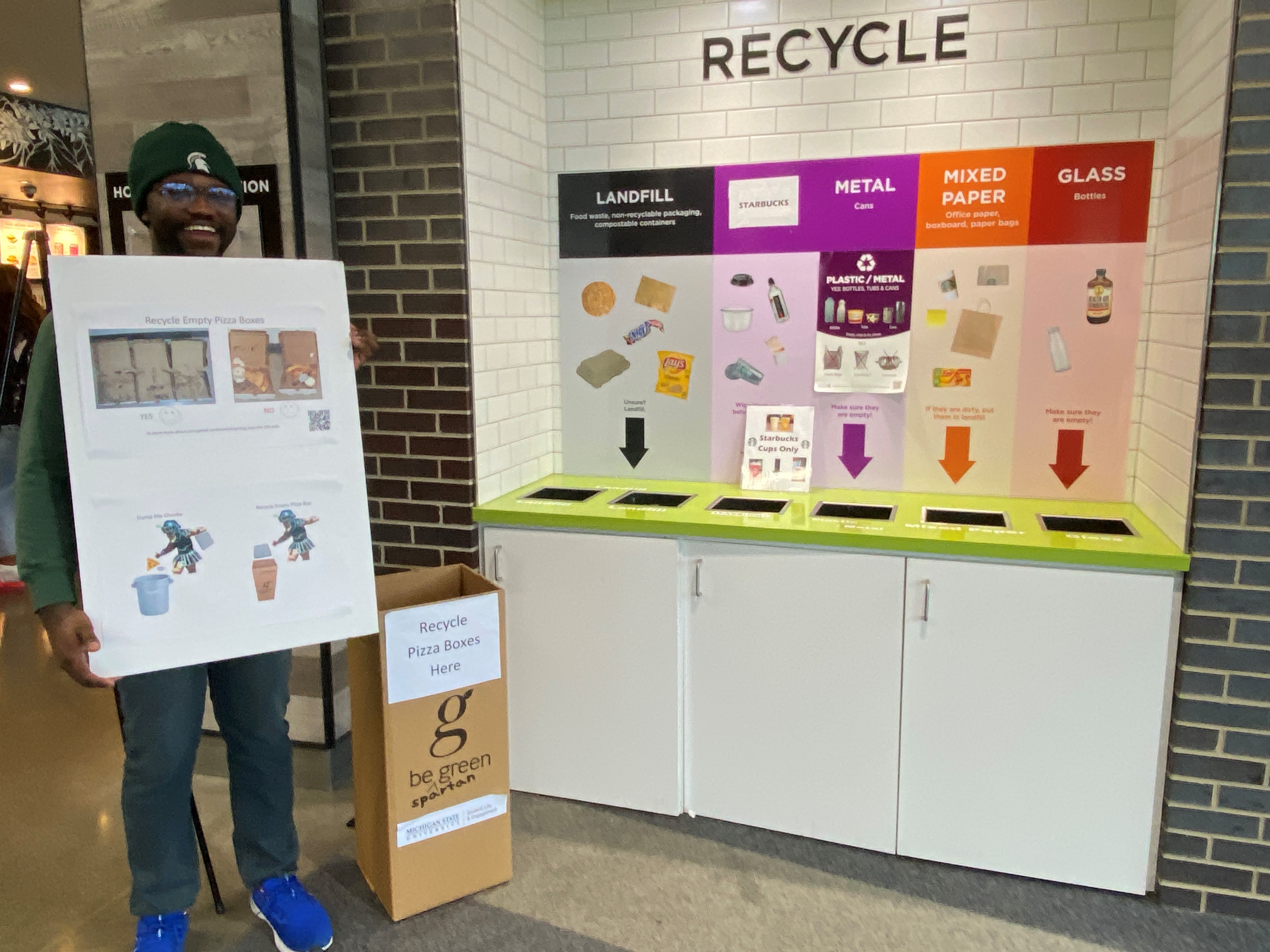
Jerome Hamilton showing the recycling bin and one of the graphics used to encourage pizza box recycling
Jerome Hamilton, a junior majoring in Political Science and Fisheries & Wildlife, just published a write-up of his research in Bridge magazine, Michigan’s largest nonprofit news service. Jerome teamed up last semester with Nathan Moore and Dr. Bill McConnell (Geography, Environment, and Spatial Sciences) to find out if they could persuade students to act on a little-known fact about recycling: that greasy pizza boxes, if emptied of food, can be recycled. By designing a collection box and signage outside a campus takeout eatery, they found that students could be persuaded to recycle an item they have always placed in the trash. That’s an important finding given that an astonishing 3 billion pizza boxes are used every year in the US. Here’s Jerome’s article in full.
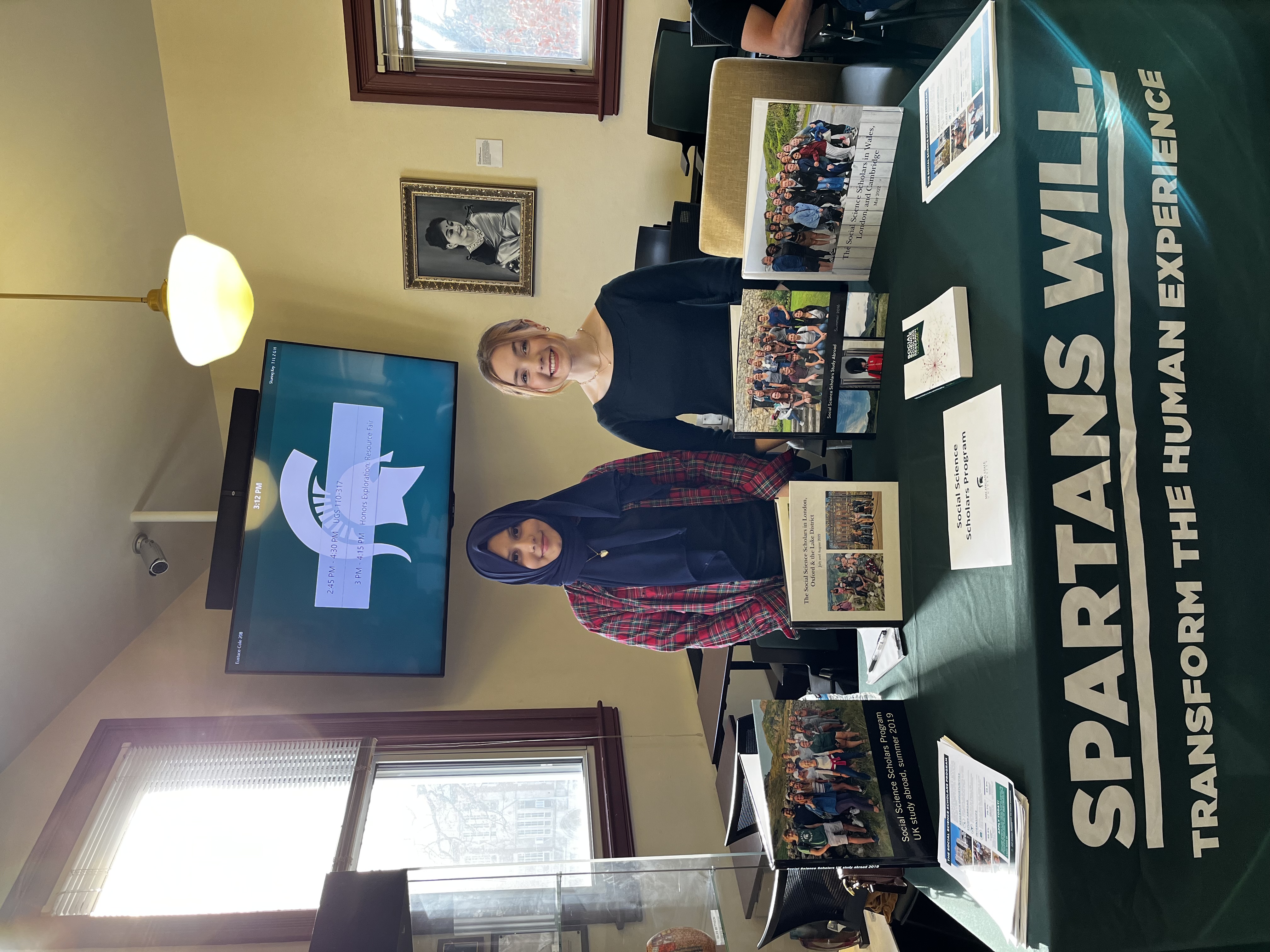
Sumaiya Imad and Sophia Futo, recipients of a competitive PURI award.
Several Scholars won competitive research funding this semester from the College of Social Science.
Sumaiya Imad, a freshman from Bangladesh, and Sophia Futo, a freshman from Ohio, were awarded Provost Undergraduate Research Initiative (PURI) funding to carry out research on how people with lived experience of psychosis can be more meaningfully involved in the framing of research in clinical psychology. This is part of a new Scholars collaboration with a Psychology research group, led by Katy Thakkar, which is seeking to improve the usefulness of psychosis research by learning from ‘experts by experience’. This is very important given that people who experience psychosis have a deep awareness of symptomology, of the factors that can ease or intensify the negative and positive features of psychosis, and of the challenges to accessing care.

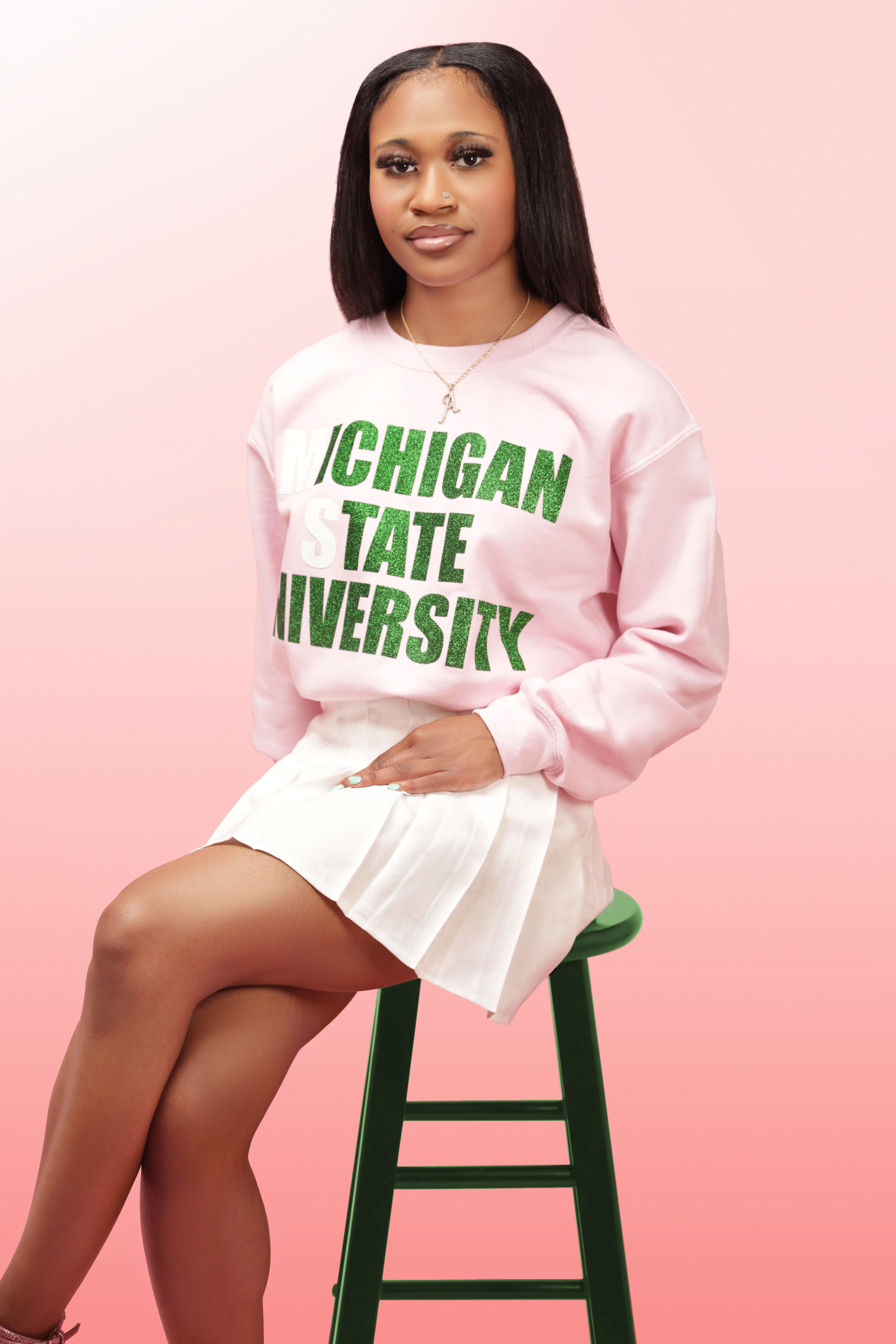
A'Nya Burks and Jaida Gouldbourne, both recipients of competetive provost’s research funding to work with Dr. Walter Hawthorne
A'Nya Burks, a freshman studying Psychology, and Jaida Goldbourne, a sophomore Criminal Justice major, were both awarded PURIs to work with Dr. Walter Hawthorne on Enslaved.org, a project that is housed at MSU and involves collaborations with scholars at the University of Maryland and Harvard University. Their roles will be to carry out original archival work for this important and well-established project which seeks to document the people involved in and victimized by the slave trade and the slave system. Enslaved.org humanizes the study of the slave trade by centering individuals who were enslaved. It reveals much about people who have too often been written out of history. Several other Scholars have been involved in Enslaved.org, all of whom have published their findings and/or presented at a professional conference.
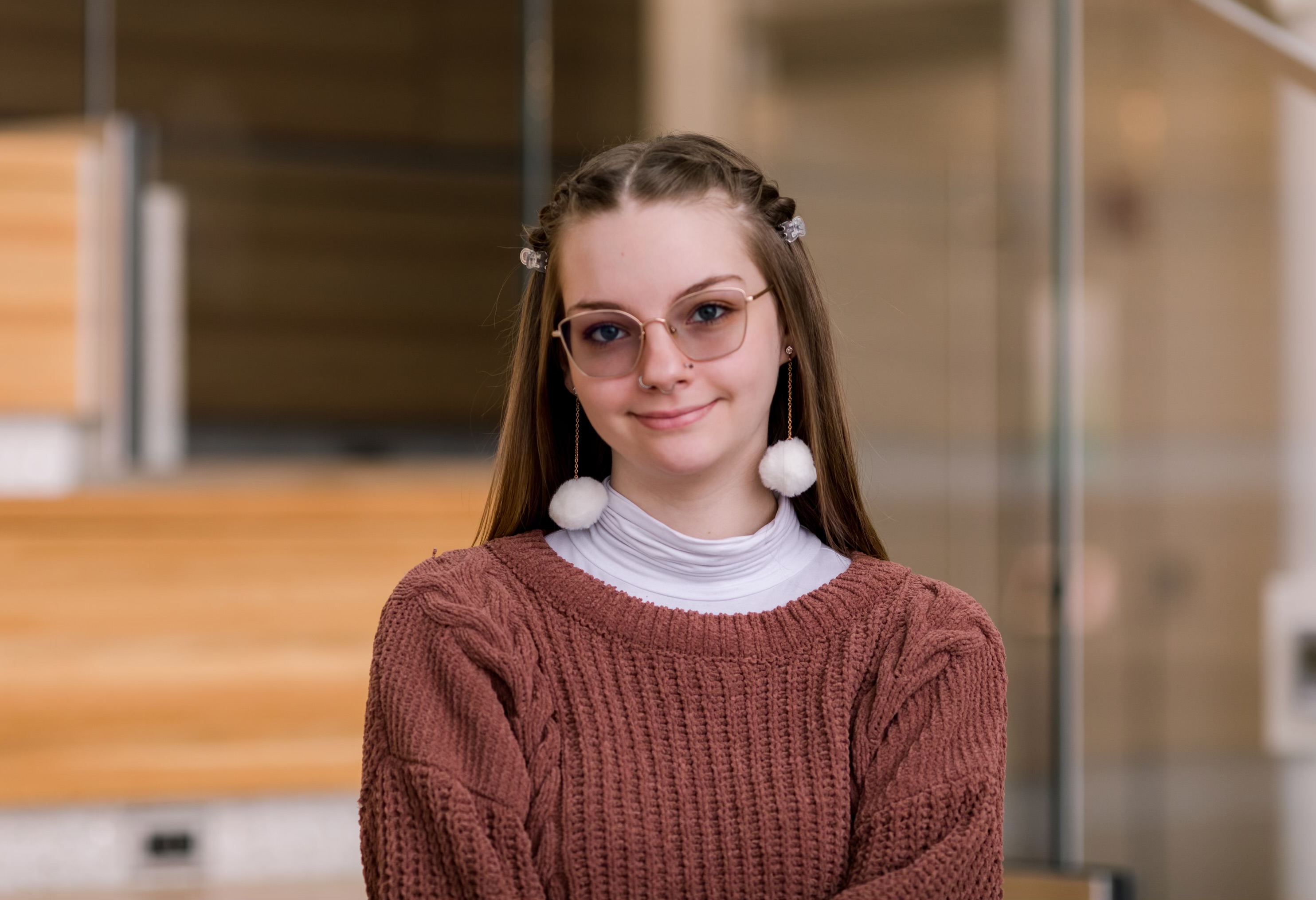
Taylor Murdick, a sophomore Scholar, who will receive PURI funding to work with Dr. Karen Holt
Taylor Murdick, a sophomore Scholar, will receive PURI funding to work with Dr. Karen Holt (School of Criminal Justice) to assess the ways that offenders who produce, distribute, and consume illegal and explicit internet material share such content and organize in online spaces. The goal of this highly significant study is to advance our understanding of the practices of offenders, the organizational structure of these actor networks, and the investigative techniques employed by police to affect their operations.
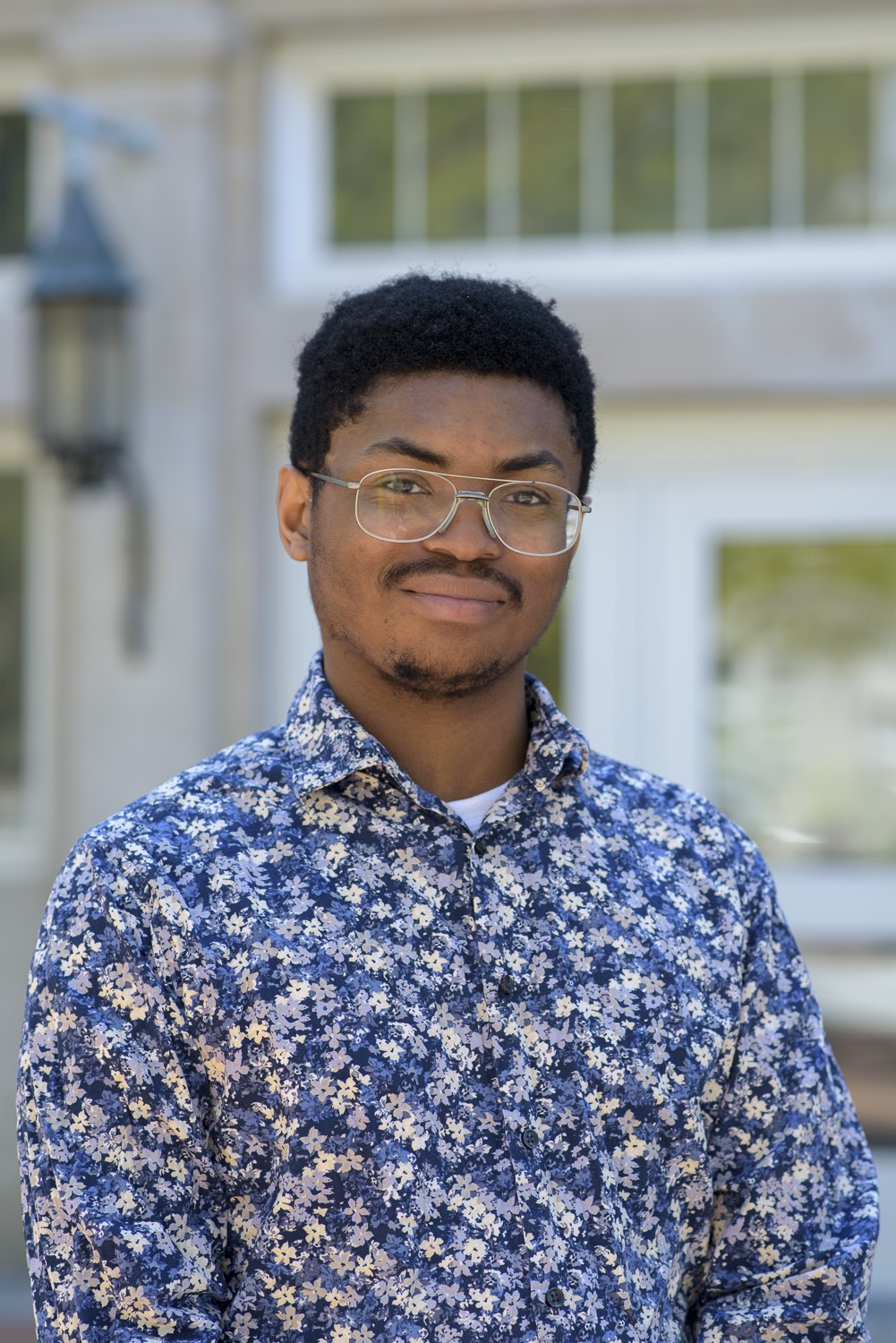
Justin Crouch, a senior Scholar and first recipient of the Henderson Family Award
Justin Crouch, no stranger to our newsletter lists of accomplishments, has the honor of being named the first recipient of the Henderson Family Award. The scholarship is due to the generosity of Harold and Franzine Henderson. A 1972 graduate of the College of Social Science, Harold also graduated from Harvard Law School and served for 16 years as the Executive Vice President for Labor Relations and Chairman of the Management Council Executive Committee for the National Football League. Harold has been a keen supporter of Enslaved.org and Justin has already been involved in the project for two years, working with Dr. Walter Hawthorne and Heather Bollinger, an archivist in Virginia, to extract information about enslaved individuals from wills and inventories of the holdings of enslavers, including some of our nation’s ‘Founding Fathers’. Justin has published his findings in the Journal of Slavery and Data Preservation. “I am proud of Justin and his work,” Dr. Hawthorne said, “It is quite remarkable for an undergrad to publish a peer-reviewed article.” Justin’s enthusiasm for the project, which the Henderson Family Award makes possible, runs deep. “This is about people's history, even my own history because I have ancestors who were enslaved people.”

Bailey Griffin, a junior studying Interdisciplinary Social Science and African and African American Studies, presenting some of her research
Bailey Griffin, a junior studying Interdisciplinary Social Science and African and African American Studies, and Katie Heeder, majoring in Human Development and Family Studies and Social Relations and Policy in James Madison College, recently gave a paper to an online conference organized by Dr. Michelle Bachelor of Spelman College entitled ‘Feminisms and Rhetoric’. Their paper, ‘Teaching Radical Self-Care’ is a study of how Black faculty and students can better safeguard their wellbeing at predominantly white universities. This is Bailey’s sixth conference!
Here’s a first for the Scholars Program: a student on the verge of launching a new consumer product! Shubham Aggarwal, majoring in Economics, was recently made a Vandervarro Scholar by MSU’s Burgess Institute for Entrepreneurship and Innovation.This is a highly competitive honor which is awarded to students who display conspicuous ‘academic excellence’, an ‘innovative mindset’, and a ‘drive for success’ in their entrepreneurial ventures. Shubham will now receive funding and mentorship to bring to market ‘Foxpops’, a form of a popular snack in India which is made from seasoned, popped water lily seeds. P.S. They’re delicious. BREAKING NEWS: at his very first pitch competition last weekend, at the Michigan Collegiate Startup Challenge, Shubham took fourth place, competing against teams from colleges across the state.
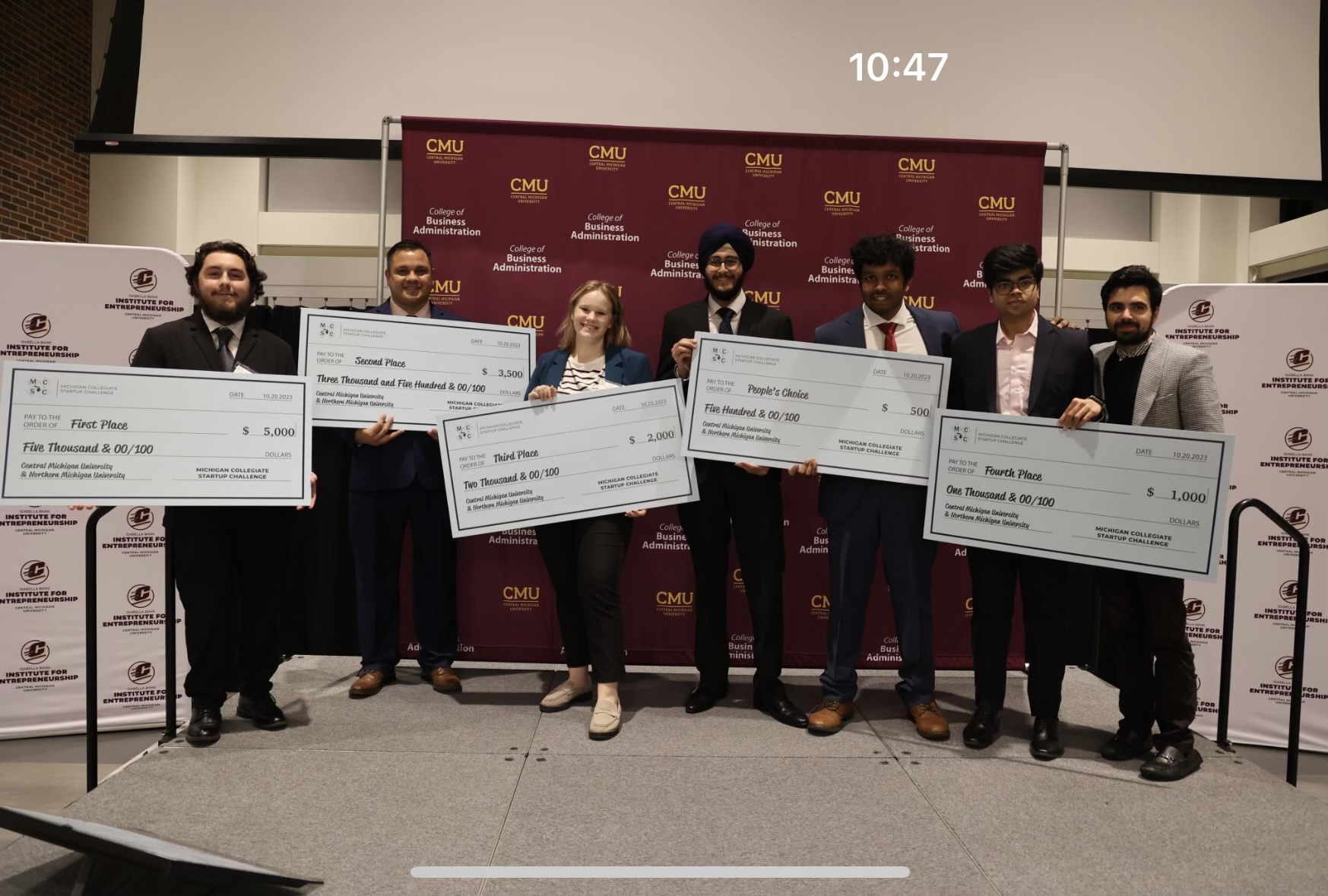
Shubham Aggarwal, majoring in Economics, who was recently made a Vandervarro Scholar by MSU’s Burgess Institute for Entrepreneurship and Innovation to develop a snack food made from popped water lily seeds. Above, you see he received an award (second from left) at the Michigan Collegiate Startup Challenge.
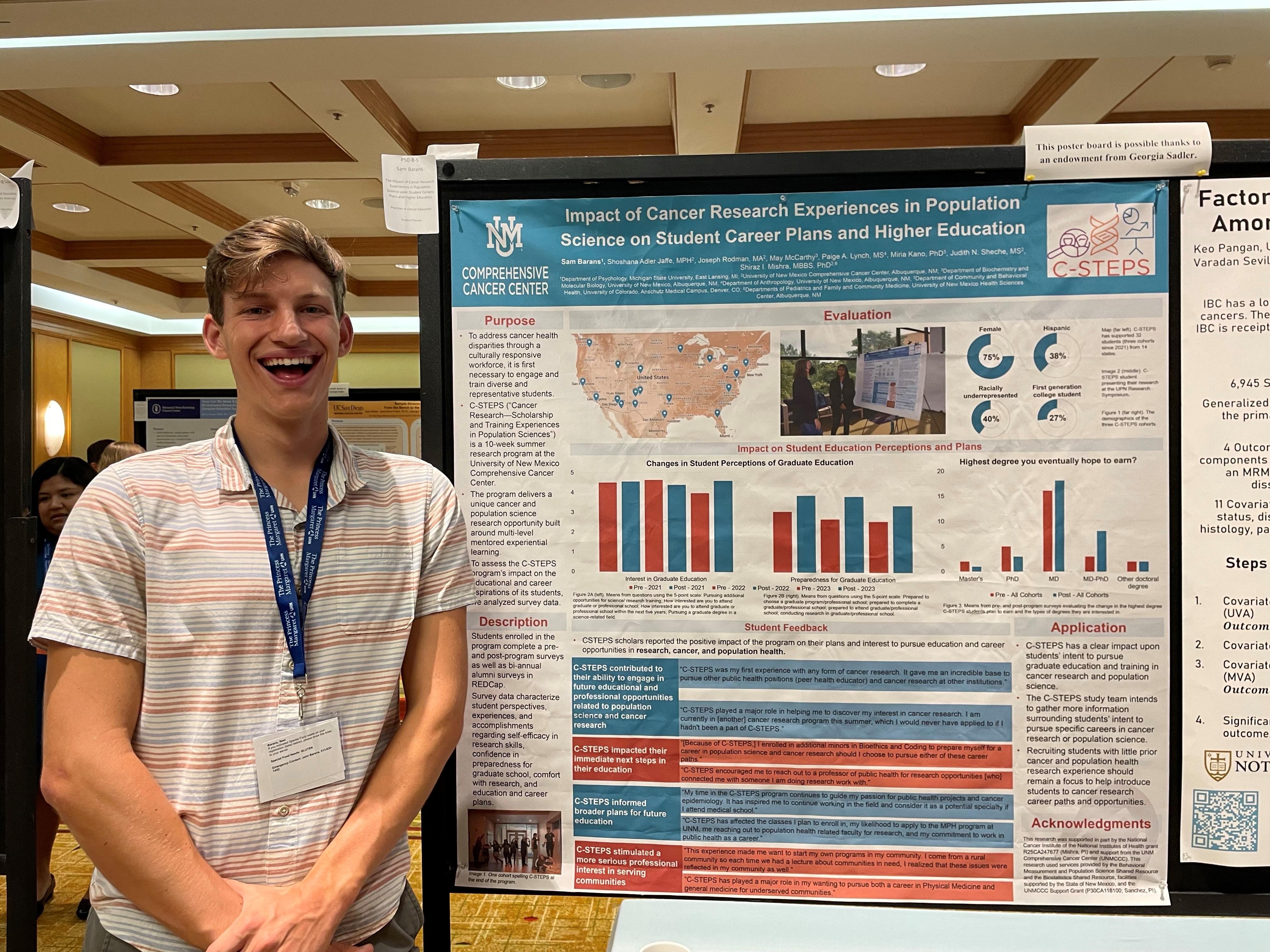
Sam Barans, who is doing majors in Psychology and Mathematics, presenting a poster at the International Cancer Education Conference in Toronto
Finally, Sam Barans, who is majoring in Psychology and Mathematics, recently gave a poster presentation at the International Cancer Education Conference in Toronto. He presented on the results of a study, supervised by University of New Mexico faculty, on the importance of summer programs on cancer and population science research for encouraging young professional to enter these fields. Just as impressively, Sam is first author on this academic paper on how clinicians can best learn about episodes of trauma among youth at high risk for developing psychosis
Well done all – including to everyone who did something very fine for which there’s no room in this newsletter!
Representing MSU in the College Fed Challenge
By Dr. Tony Doblas-Madrid, Department of Economics
What would you do if you literally could create unlimited amounts of money? Not monopoly money. Actual United States Dollars. Lorenzo Durán-Charris and Sharmila Suresh are part of an MSU team of students answering this mindboggling yet very real question that the Federal Reserve grapples with on an ongoing basis to decide how to set monetary policy. The College Fed Challenge is an academic competition where student teams from colleges and universities around the country research economic conditions and present their analysis and monetary policy recommendations at the Federal Reserve. MSU is in the 7th District, of the Federal Reserve Bank of Chicago. District winners advance to the national finals. Undaunted by the tough competition, MSU students have brilliantly represented our school over the years, reaching the district finals on multiple occasions and being crowned district champions and national finalists in 2020.
Over the last couple of years, Social Science Scholars Lorenzo and Sharmila have made tremendous contributions to the team, in their roles as speakers, serving as de facto mentors for new team members, and doing lots of in-depth research to formulate sound proposals. This year, the MSU team brings to the competition a thoroughly researched plan, which carefully balances inflation and unemployment risks by continuing quantitative tightening policies but pausing short term interest rate hikes. The persuasively presented 15-minute video has been submitted to the Federal Reserve. With our fingers crossed, we now await the judges’ response. But the team’s work is not done. Students, faculty, and alumni are helping the speakers prepare for the next round, a challenging Q&A session with Fed economists. The 2023 competition will end on November 17th at the Winner Announcement Ceremony, where judges, organizers, and Federal Reserve Chair Jay Powell will recognize and celebrate the achievements of competition participants from over 100 Colleges and Universities around the country. While the competition itself will take place remotely, in February of 2024, competition participants will visit the Federal Reserve in Washington, D.C., getting a chance to meet members of other teams, judges, and Federal Reserve economists. We wish Sharmila and Lorenzo, and their fellow team members, the very best of luck.
BREAKING NEWS: Sharmila and Lorenzo, and their three colleagues, Sophie Handley, Zihan Choudhury and Jack Starling, were selected as one of just eighteen teams nationwide to go into the semi-final! Incidentally, that involved beating the University of Michigan! Alas, they did not win the overall competition, but did brilliantly well in a competition entered by nearly 190 other universities.
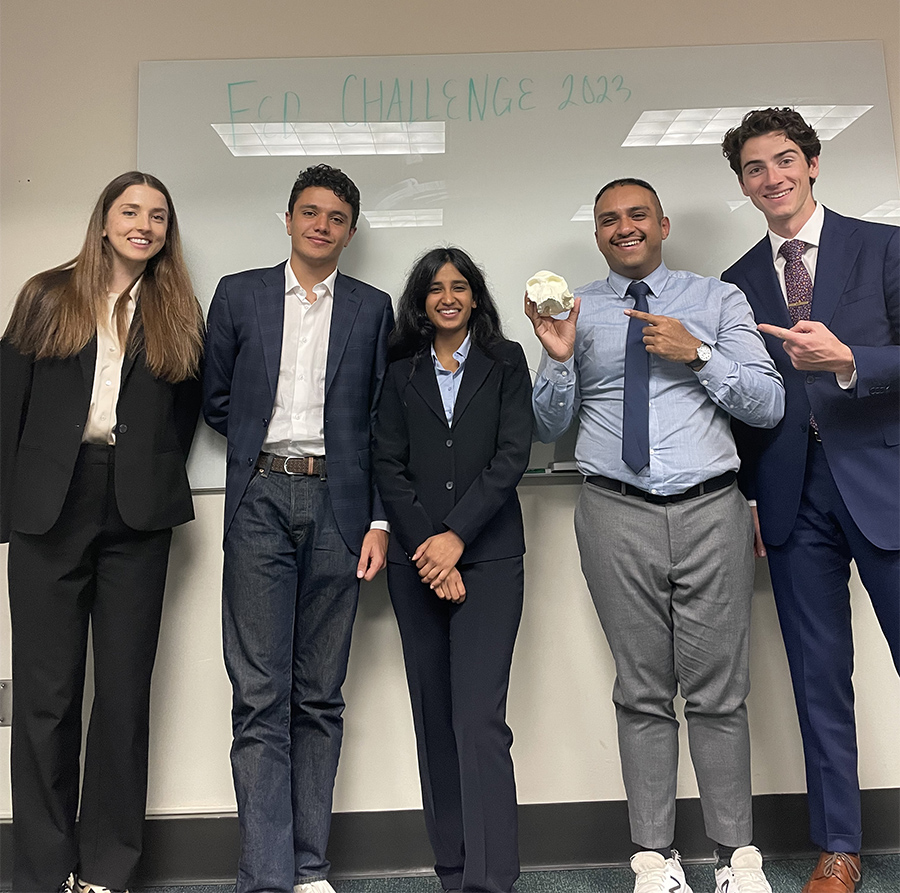
MSU’s Fed Challenge team: Lorenzo Duran, Sharmila Suresh, Sophie Handley, Zihan Choudhury and Jack Starling. Lorenzo and Sharmila are second and third from the left.
Social Science Scholars in Africa
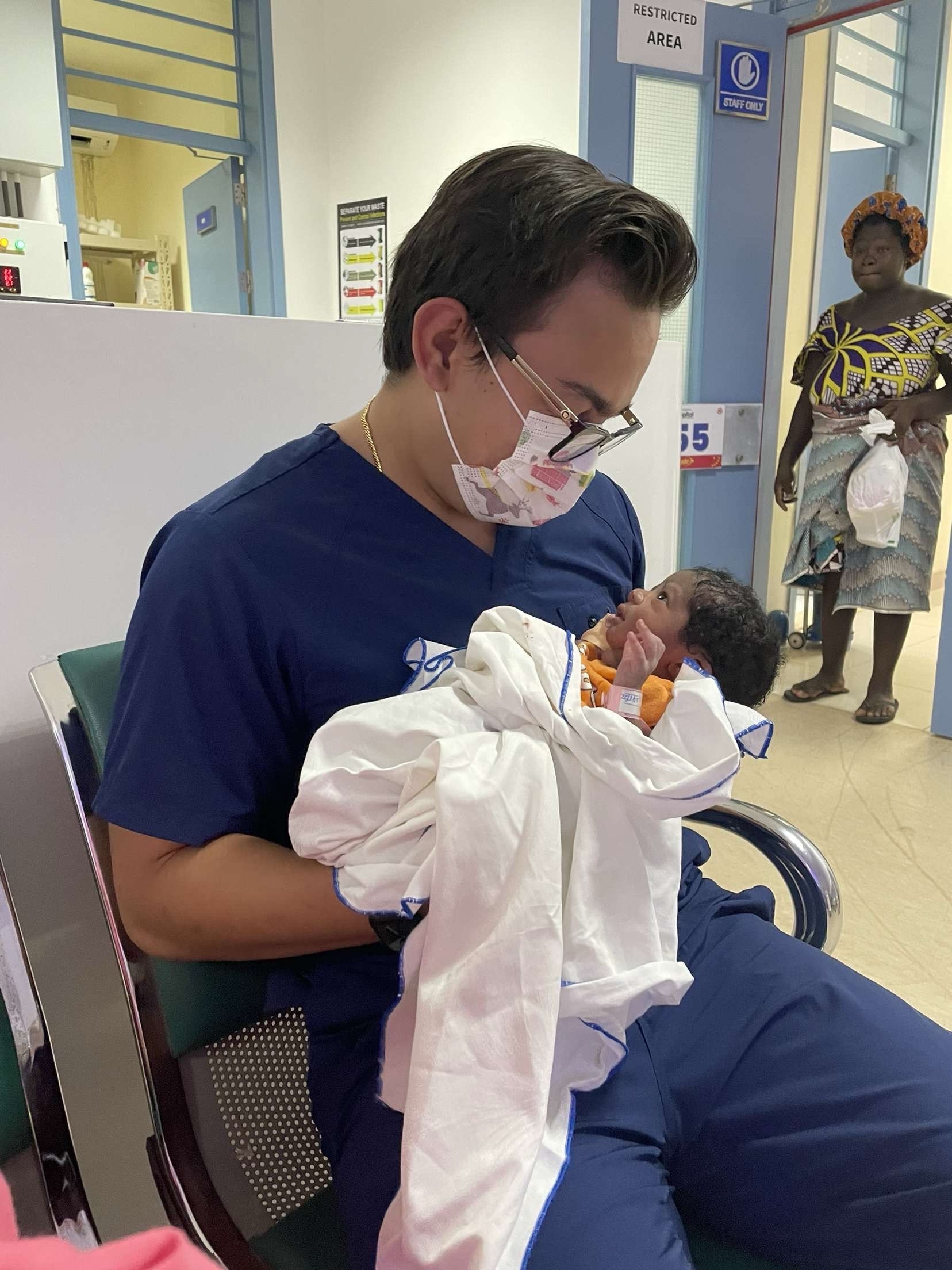
Brennan Haugen in Ghana last summer
Experiencing sub-Saharan Africa is something I wish every student could do before graduating. A region that has been inhabited by humans for about 200,000 years longer than anywhere else on earth, it contains more than 1,500 separate languages and is home to many of the most ethnically diverse countries on Earth. Nowhere is better suited to students looking to acquire the grit and self-belief that comes from having coped with the unexpected and becoming culturally adjusted to the unfamiliar but wonderful. Last summer, four Scholars spent time in Africa, Brennan Haugen in Ghana, Nel Robinson in Zambia, and Zeyu Li (‘Jimmy’) and Zach Sebree in Tanzania. What follows is a brief narrative about their experiences, impressions, and observations.
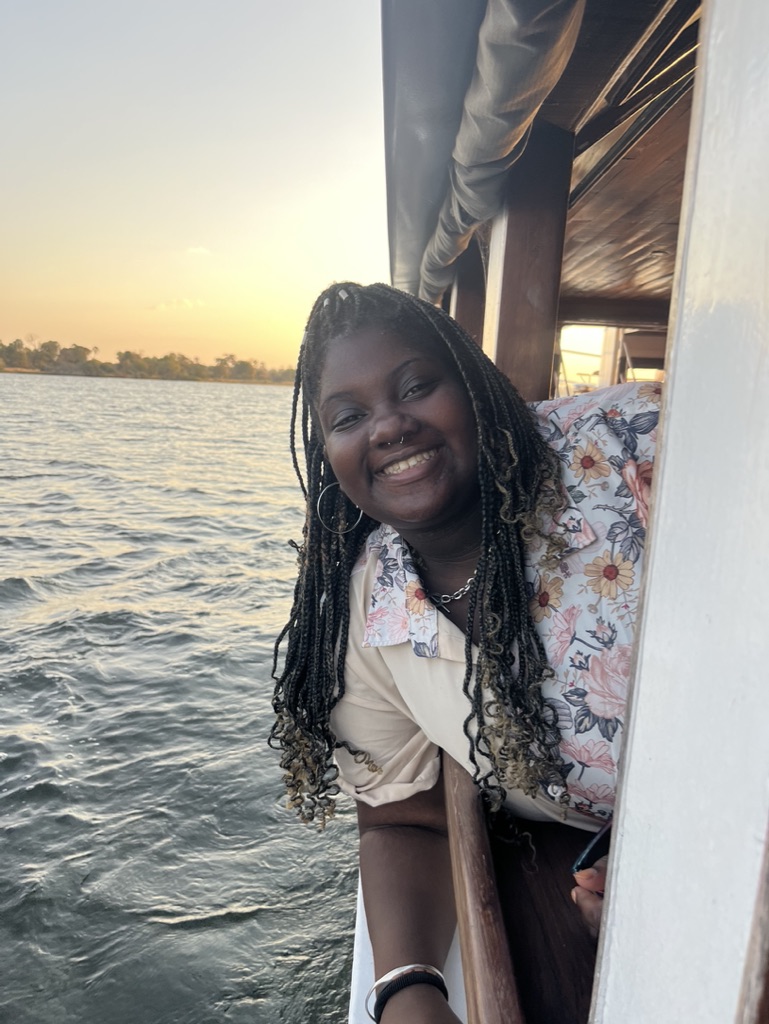
Nel Robinson in Zambia last summer
Each of these trips was focused in some fashion on development in the areas of basic needs, education, healthcare, or politics. Brennan’s trip involved seeing first-hand how medical care was delivered in Ghana and hearing from politicians about the challenges of reducing rates of infant mortality and disability induced at birth. Nel’s month in Zambia involved studying the growing presence of women in politics and the obstacles they had to overcome in order to defeat male rivals in elections. Zach spent nearly 2 months in Tanzania, first on a trip to improve his Swahili language skills and then joined the Tanzania Partnership Program (TPP), a long-term collaboration among MSU, and local and international organizations designed to improve local livelihoods and promoting community resiliency in Tanzania. Jimmy also participated in the latter program.

Zeyu Li (‘Jimmy’) (second from left) in Tanzania last summer
All four students shared many of the same reactions and insights. Above all else, they felt an initial sense of shock at the unfamiliar. ‘It was mostly the small things that surprised me first’, wrote Zach ‘the livestock on the roads, the sheer number of people out and about, the different look and feel of it all.’ He was also struck by the ‘inescapable pictures of the president and leading political party and the stark differences in infrastructure and economy.’
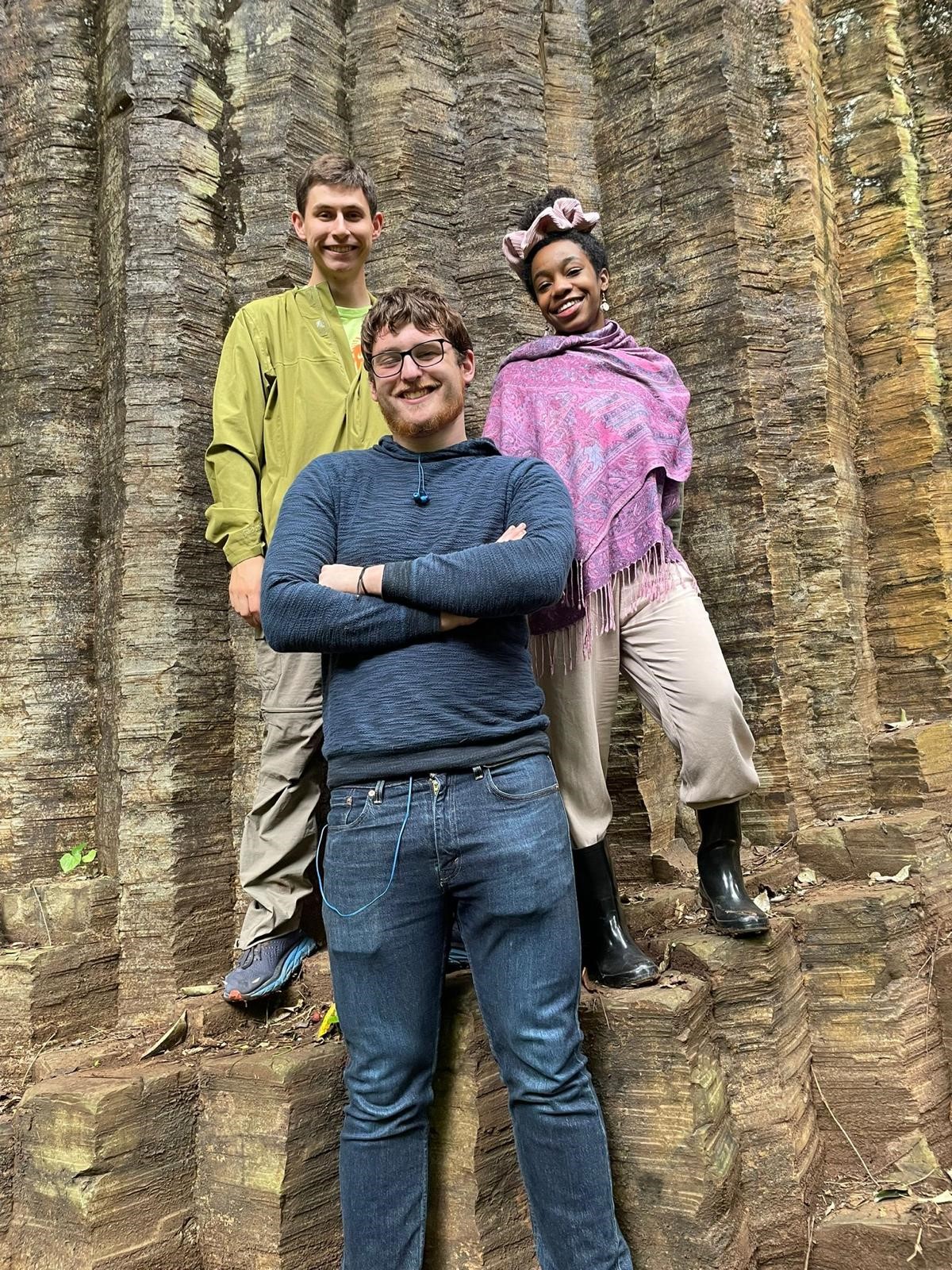
Zach Sebree (tall and middle) in Tanzania in summer 2023
Pretty soon, however, the Scholars came to deeply appreciate the people and the landscapes they encountered. Brennan writes of being ‘shocked’ but also profoundly impressed ‘by the richness of community feel’ in Ghana. He was especially moved by Ghanaian mourning practices. Billboards celebrated the deceased months after a death and specific garments were worn long after a person’s demise, both gestures that epitomized a community-focused approach to life. Jimmy relished the opportunity to study alongside ten Tanzanian students as they visited under-resourced village schools. ‘Through our daily interactions’, he writes, ‘we established close relationships’. Nel too soon felt socially comfortable due to the warmth of her welcome. She reflects on how local people seemed always willing to ‘pause in their days to connect with strangers’, adding that ‘Everyone was so kind, welcoming, and proud to show their culture.’ Nel and Brennan found their time in Zambia and Ghana, respectively, to be life-altering because they witnessed such a healthy pace of life and ease of social connections. ‘Zambia is not nearly as wealthy as the United States’, Nel writes, ‘but the warmth of the people could be seen as a more valuable form wealth.’ Likewise, Brennan reflected on how the communities he observed were ‘much stronger at working’ collectively to address problems than he those he knows at home.
Then again, there was no hiding the negative consequences of relative poverty in Ghana, Tanzania, and Zambia. Jimmy carefully documented the lack of funds available in village schools for adequate food, decent buildings, water in the dry season, and teachers and textbooks. The Tanzania Partnership Program had done much to supply needs for desks, playgrounds, health supplies, and so on, but achieving sustainable improvement is a massive challenge. As Jimmy points out, when playground items break, there is usually no way of fixing them. The same applies to solar power systems. Only by seeing Tanzanian schools for himself, Jimmy notes, could he gain a true awareness of disparities between richer countries and the rest. For Brennan, who attended a number of births and spent time in pediatric wards, it was heart-breaking to see how many babies were deprived of oxygen at birth due to limited medical technology. Having had the chance to speak with Ghanaian ministers for health and education, Brennan returned to the US determined to spend his career working to reduce rates of childhood disability in countries like Ghana. Jimmy, too, lamented how much needs to be done and recommended that people vacation in Tanzania or donate to organizations like the Tanzania Partnership Program which does all it can with limited resources. Jimmy’s awareness of the level of disadvantage led him to what he calls a ‘morality challenge’. Local students spoke of their housing and food as ‘very fancy’, which they most certainly were in comparison to the lodging and fare of local children who often went without lunch. Embarrassed by lavish lunches of meat, sides, chocolate and fruit, Jimmy and his peers chose to eat where the school kids could not see them. On returning, he reflected on the morality of spending such a lot of money on a trip to Tanzania where local communities have so little. Then again, as Jimmy also notes, the TPP does make a positive difference and many students – himself included - will put to good use the knowledge they have gained about global inequities.
And the learning gains for all four students were obviously considerable. Zach’s ability to speak Swahili rose to a new level; Nel read deeply into literature on female politicians in Zambia and interviewed women parliamentary candidates and current parliamentarians; Brennan had the privilege of seeing up close how healthcare functions in a poorer country and returned with a new sense of vocation; and Jimmy gained the depth of knowledge about economic development that cannot be conveyed in a classroom setting. Lastly, there were gain in terms of what Jimmy refers to as ‘precious friendships’. Perhaps the most remarkable connection was that made by Nel on her final day in Zambia. A man called S’mangaliso spotted her Spartan wear and introduced himself as a 1999 graduate of Michigan State’s Department of Political Science. He invited Nel to attend a Juneteenth he is organizing in Rwanda and South Africa. It’s an interaction that attests to the global reach of this university and of the exceptional opportunities it has to offer the ambitious and the bold.
Alumni in focus: Matt Durfee and Anita Kushalani
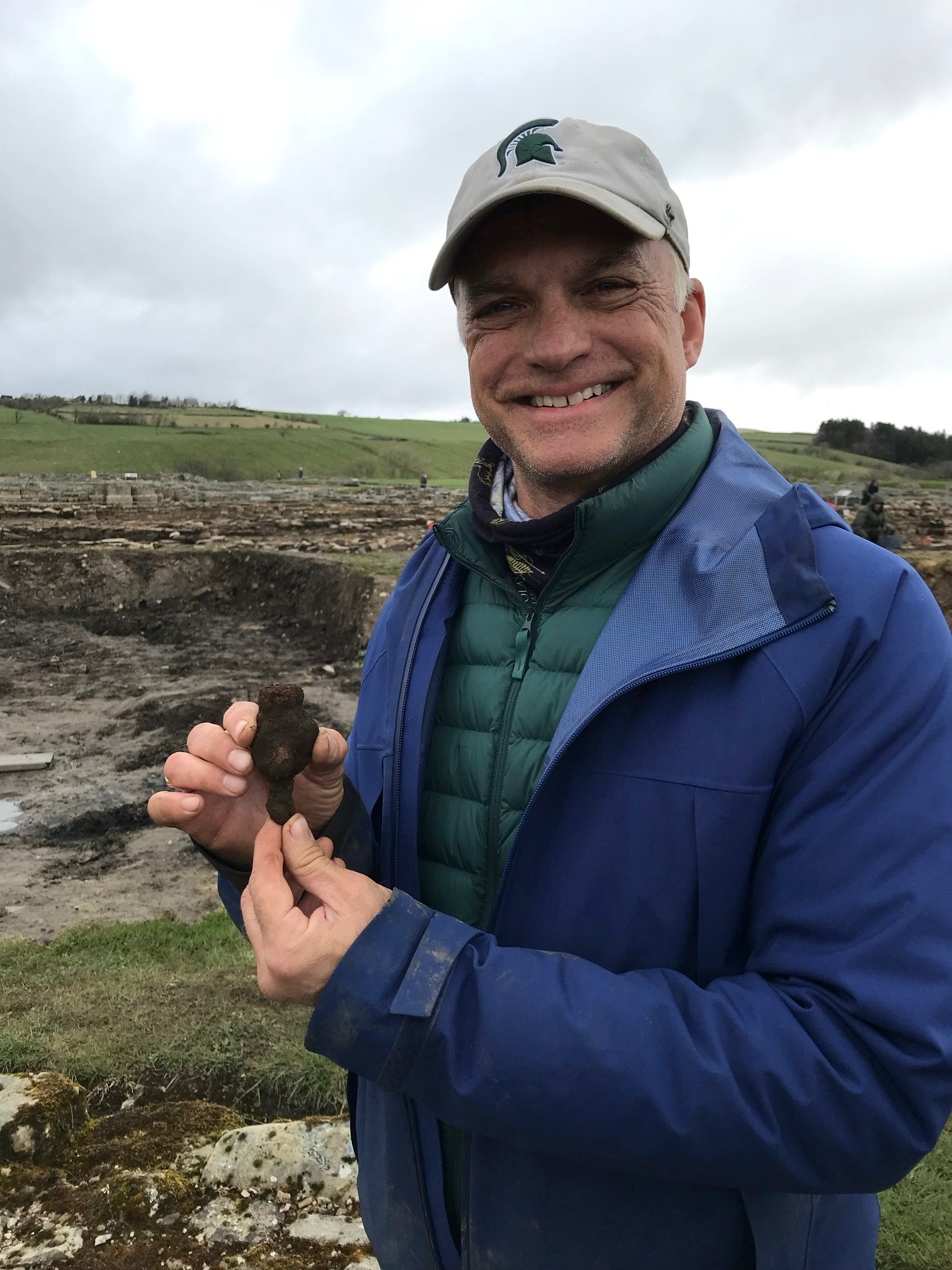
Matt Durfee on an archaeological dig at the site of the Roman city of Vindolanda near Hadrian's Wall on a typically balmy summer afternoon in northern England.
I first met Matt Durfee (BA ’82 MLIR ’83) at the Peanut Barrel after a college alumni event back in 2014 when the Scholars Program barely existed. I immediately realized that Matt was not just good company, but generous with insightful advice. Not until later did I know that Matt was completing a superb ‘how-to’ guide to securing meaningful employment, entitled Job Search Navigator, which went on to win national awards after its publication in 2016. Courtesy of Matt, I have been able to provide copies of this book to current students who are job searching; they obviously benefit from the wisdom of someone who’s had a distinguished career in Human Resources for some of America’s most famous brands and latterly as a self-employed provider of services such as outplacement, executive search, and leadership development. Over the last decade, I have had the pleasure of meeting up with Matt maybe half a dozen times and he has become a kind and valued supporter of our students, providing scholarship funds that have allowed several lower-income students to complete unpaid internships.
Last week I sent Matt some general questions about his time at MSU and his experiences as an alumnus. His responses exemplify two traits held in common by many of the Spartans who invest in the Scholars Program: a keen awareness of the challenges confronted by students who do not hail from financial privilege and an admirable creativity in finding meaning in their careers and lives. I’ll talk a little about both of these characteristics below.
When asked ‘What is it about the Scholars Program which inspires your generosity?’ Matt answered candidly: ‘it was due to the financial hardships that I endured as a student.’ Half-way though sophomore year, Matt’s parents broke to him the news that they could no longer afford to pay his tuition. Unable to see how he could afford to stay, Matt left MSU for six months and traveled to Las Vegas where he briefly considered a new degree in casino management. He then returned to his native Flint area only to find an unemployment rate of 25% which, as Matt notes, was a higher level than during the Great Depression. Ultimately, Matt was able to return to MSU where he found work at the Physical Plant. His income from this job, combined with student loans, allowed him to earn his Bachelor’s degree in Political Science and then a Master’s degree in Human Resources & Labor Relations. Of course, at one level, Matt’s story shows what is possible when brains, grit, and work ethic are combined. But, as he is quick to point out, there were real personal costs to his being perpetually ‘broke’ while at MSU. First, Matt writes, he ‘didn’t really have the time or money to have much fun’. Second, and very importantly, he ‘didn’t have the opportunity to get practical work experience in Human Resources before [he] graduated’. As Matt adds, an inability to afford to do an unpaid internship ‘contributed to me having great difficulty finding employment.’ In the event, soon after graduating, Matt secured a position with Marriott’s Corporate Office in its Employee Relations Department. However, he acknowledges that, lacking corporate experience, he was in some ways ‘fortunate to land’ such a position, and he was very relieved to do so given that student loan repayments loomed threateningly.
These are important insights when one considers how much more modern students are up against. According to a Forbes report in May of this year, the inflation-adjusted price of attending a four-year college – including tuition, fees, and room and board – was $10,231 in 1980 but $28,775 by 2019-20. That amounts to a staggering increase of 180% (if you’re wondering where the money goes, it’s far from clear, but it is the case that colleges now provide more services outside the classroom and state funding has dropped considerably). It’s no surprise, then, that many of today’s universities have fewer students from under-privileged backgrounds than they did in the past. On top of this, as Dr. Bill Cooke pointed out in his rightly glowing foreword to Matt’s Job Search Navigator, ‘Today’s global marketplace continues to become ever more competitive, unpredictable, and unforgiving’. As a result, it’s harder to get one of those stable, well-paying jobs that allowed America’s middle class to expand so rapidly in the post-war decades. This is why Matt’s point about the challenges of finding work without a prior internship is so apposite. A recent report in the Harvard Business Review on a national survey of 4,000 US seniors, revealed that nearly half of internships at for-profit companies are unpaid and that women, minorities, and first-generation students are the least likely to secure one of the coveted paid roles. What this means is that, unless poorer students can find outside funds, they will often have to abandon the dream of an internship which is often essential for a successful career search.
It is in this context of increased college fees and a paucity of paid internships that the generosity of alumni like Matt Durfee is so pivotal. If we wish for our students to realize their potentials – and in the Scholars Program I see many of the most able young people I have ever encountered – then it’s essential that we have scholarship funds that permit them to intern over the summer rather than only doing mundane jobs. Rather wonderfully, Matt quotes Ophelia from ‘Hamlet’ in Job Search Navigator: ‘We know what we are, but know not what we may be’ (Act IV, Scene 5). It is through the internship that lots of Scholars discover their paths, often unexpectedly, and it is by virtue of scholarships like those provided by Matt that they are able to do so. This is precisely why Matt supports the Scholas Program and it’s why he describes its goal of providing opportunities for students from all backgrounds as ‘very, very personal to me.’
I’d like now to shift tack to say more about Matt’s career because it is a very fine one for students and graduates to emulate. For a start, by dint of high ability and hard work, Matt moved on from the Marriott to hold positions as chief human resources officer, senior vice president, vice president, and human recourses management for such companies as Coca-Cola, Nestle, Pepsi, Hard Rock, and more. But he also had the courage and determination to, as he says, ‘take more control of my life’ and start his own business in 2006 called Navigator Executive Advisors. Just as significantly, Matt has kept room in his life for a passion that’s largely unrelated to the corporate world. Several years ago, ‘as really more of a hobby than a business’, he launched Historic Hiking Adventures. Each year, Matt leads a group of people to hike along the ruins of Roman Emperor Hadrian’s famous defensive wall in the far, windswept north of England. These trips allow Matt to share his fascination for learning about Emperor Hadrian and the Roman Empire, an enthusiasm that’s seen him elected to the Society of Antiquaries of Newcastle upon Tyne. Having seen photographs of Matt’s trips, as well as of his participation in archeological digs in the remains of the Roman fort at Vindolanda, it’s clear that he has found that counter-balance to regular work which is so important for keeping life fresh and exciting.
In closing, I’d like to reflect on Matt’s incisive advice for students who are soon to graduate: that they should ‘study for interviews with the same level of focus, diligence and effort that they do for final exams!’ It sounds obvious, but I doubt I’m unusual in having tried to wing my first interviews (with predictably grim results). Matt confesses to having also been ‘woefully unprepared’ for ‘on-campus interviews’ due to not having ‘taken the time to anticipate nor study for how to respond to possible questions from the recruiter.’ Fortunately, our students have Matt’s Job Search Navigator, a book replete with advice on how to prepare, as well as how to find jobs, how to network, and how to negotiate. As I noted earlier, a number of Scholars have already approached their first job searches with the advantage of having internalized Matt’s advice. A couple of weeks ago Matt forwarded me an email sent to him unbidden by a current Scholar who has been the recipient of scholarship funds for an internship and is looking for a job in finance. ‘In preparation for a season of job interviews,’ he wrote: ‘I have reworked my strategy and rewritten my resume, all thanks to your advice. With the certainty that others will find it just as useful, thank you for your generous support and continued commitment to shaping Spartan careers.’ Well said indeed. And thank you Matt for helping us to nurture the wonderfully talented students who pass through this program.
Anita Kushalani
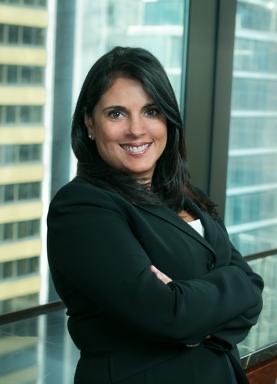
Anita Kushalani, alumna of Michigan State, supporter of the Scholars Program and the Women’s Leadership Institute.
I had the pleasure of first meeting Anita several years ago when she was reconnecting with her alma mater and looking to give back, in her late mother’s memory, to an institution at which she had thrived. Since then, Anita has been a deeply valued and generous supporter of our students. More recently, she has begun a new series of workshops to help students, and especially women Scholars, to be better prepared for the challenges of professional life, not least by becoming effective networkers, negotiators, and financial planners. The first session, held last month, drew about 20 current Scholars who eagerly embraced the opportunity to learn from someone who is a past master in each of these areas. For this newsletter, Samyuktha and I posed several questions to Anita. You can read her responses below.
- What was your undergraduate experience like? What did you most value and what did you wish had been more readily available?
I had a great experience at MSU, both academically and socially. One of the things I valued about being at a large school with diverse course offerings is that it made it easy to change my course of study and major. I had started out as a Psychology major with the intention of going to graduate school and eventually becoming a therapist. But in my sophomore year, I came to the conclusion that this path was not a good fit for me, so I researched other majors and professions, and with the help of an academic advisor, I was able to add Employment Relations as a major within the College of Social Science. I took Economics and Business classes in addition to Psychology and Sociology, which prepared me for my career in Human Resources, and eventually Employment Law.
- You have held many roles in your career both in law and in social advocacy. What led to your interest and involvement in mentoring women, working on immigration issues, and providing legal help?
We all need help during our academic and professional journeys. I've been fortunate in having some wonderful mentors along the way from whom I've learned so much. They were generous with their time and wisdom, and I'd like to pay forward that generosity by helping women who are starting their careers. As for providing pro bono legal services, the impetus was seeing how difficult it is for people of limited means to navigate the legal process (whether it is filing a petition for asylum or a claim for unpaid wages). The success of a valid claim is often not based on the merits of the claim but the presence of a competent advocate. Volunteering my time or donating to legal services organizations is my attempt at leveling the playing field.
- What motivated you to become so involved at MSU as an alumna?
One of the things I've recognized and appreciated over the years is being able to graduate from a great institution without significant debt. This allowed me to pursue my career in Human Resources and consider law school without the impediment of loan repayments. Part of the reason for that is that MSU is still relatively affordable and is a great value. The other is that I was fortunate enough to have a parent who was able to financially support me while I was an undergraduate at MSU. My contributions to MSU began as a way to honor my mother for her support, but over the years my engagement has become more personal and I've really come to enjoy my interactions with undergraduates and faculty.
- How has your experience been in mentoring students both through the Women’s Leadership Institute and the Scholars Workplace Readiness Workshop?
I have met a number of students through my involvement with WLI and with the Scholars, and have to say that to a person everyone I've met is a serious, smart, and focused individual. I've been very impressed with the caliber of students in these programs.
- What are some of the primary things that undergraduates should know as they approach graduation?
One of the things that took me some time to learn is how to advocate for myself, whether it was during a salary negotiation, highlighting significant accomplishments on a specific project, or in any of the myriad of circumstances that come up during one's professional career. So I would say to undergraduates that they need to develop this skill quickly. I would ask them to remind themselves of the value they bring to an employer and learn how to articulate this value to them.
- Lastly, how do you like to spend your free time outside of your varied commitments and philanthropy?
I enjoy reading almost anything but recently it's been a lot of mysteries and thrillers. I've also been taking art classes and have enjoyed exploring different methods for creating art. And, I enjoy traveling with my husband, friends and family.
Update on the Scholars Community Garden
Dr. Melissa Fore
The Social Science Scholars Program has a wonderful new community outreach program in partnership with the Fledge organization in Lansing. Because of this partnership, a neighborhood plot of land that was once a blighted property is now a vibrant community garden – the Daniella and Charlie Sunshine Garden - that offers residents on Riley street an array of fresh vegetables and a chance to spend time in nature. Around the corner is the Women and Children’s Shelter on Cedar Street, and several of the residents have helped water the raised beds and harvested food through the summer and fall. Social Science Scholars have big dreams for the property and plan to have a “Little Seed Library,” a pathway of painted rocks, a fire pit area that could be a meeting space for outdoor activities, a butterfly garden filled with native wildflowers, and hands-on activities with children in the shelter about healthy eating and fresh foods. Thank you to the Scholars who helped clean up the property and plant fruit trees, a strawberry patch, build raise beds, spread mulch, and cultivate good will in a South Side neighborhood.
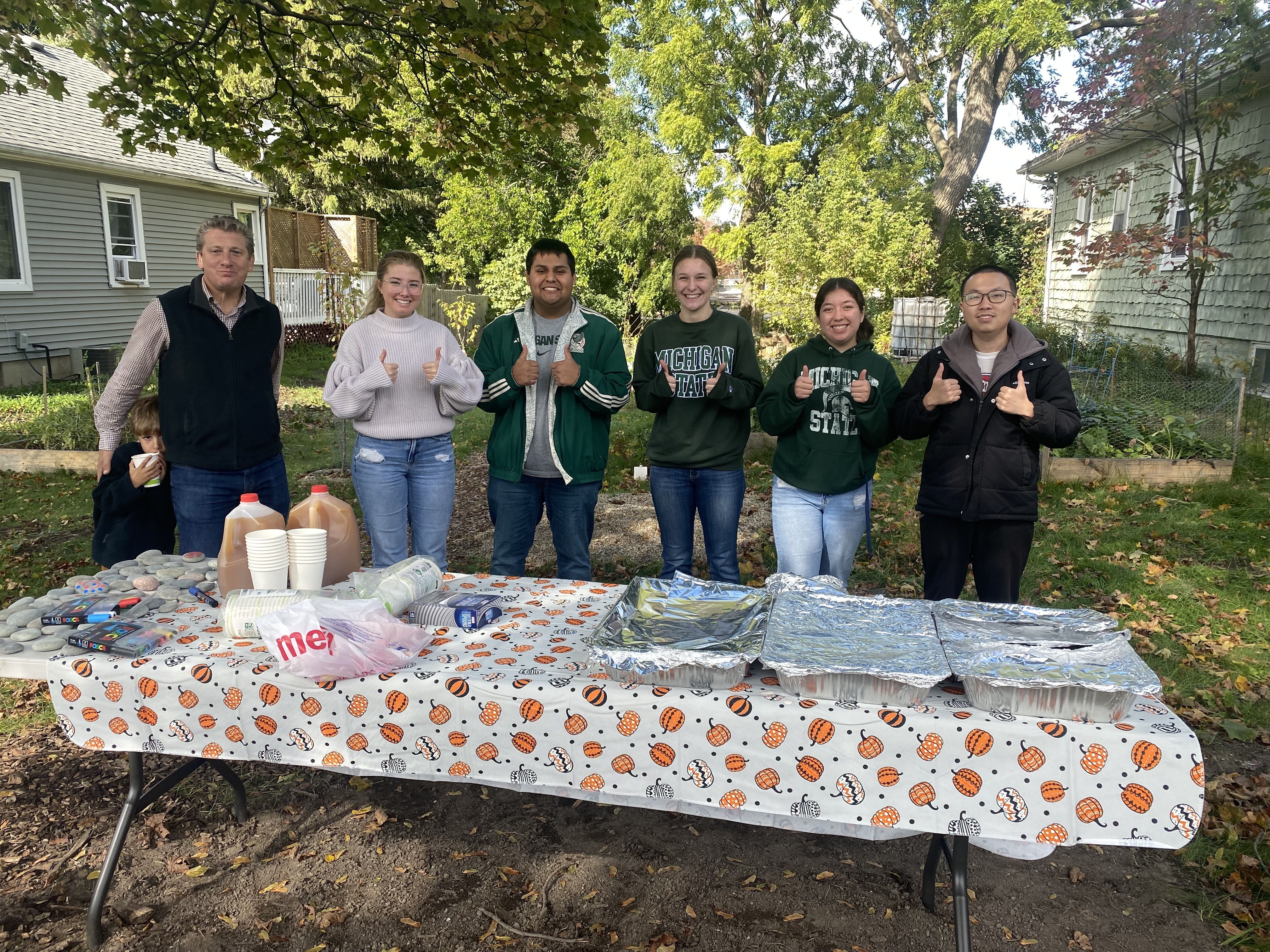
Students at Daniella and Charlie’s Sunshine Garden, the Scholars Program’s community garden initiative
Our first season in the garden culminated in a Harvest Party to say thank you to the neighbors for welcoming us into their community. Using ingredients from our garden, we made homemade zucchini bread, squash flower quesadillas, Fresas con Crema, and vegan apple crisp. Party attendees also painted rocks for the path and shared how the garden brought solace to them during the summer months. It was a delight to see neighbors chatting in the garden, sometimes for the first time, and for women from the nearby shelter to meet their neighbors and our students. As well as providing fresh food, the garden has become a sanctuary of peace and unassuming beauty. We’ll long remember how movingly a resident of the shelter told us about how often she goes to the garden to sit on one of the logs that’s been turned into a seat to relax and reflect. What a wonderful difference it makes to transform blight into a place which can deliver up a bounty of both food and connection.
Alumna spotlight: Shay Rockett (Psychology, ’20) and Andrew Rockett (History, ’20)

Shay and Andrew at graduation
What are some of your favorite memories of MSU?
Shay: My favorite memories are all connected to the program! Coming from a small town, having a group of 20 people with similar interests represented a source of comfort and familiarity. Even though being surrounded by so many brilliant people was a tad overwhelming at first, I got so many amazing experiences out of it. I was able to study abroad (twice!), complete multiple internships, work on a variety of research trials, and somehow maintain a semi-regular sleep schedule.
Andrew: Overall, I look back fondly on the entire period I was at MSU. I was in a great place surrounded by great people. Some favorite memories include: meeting Shay on the first day of orientation (she does not remember this), actually getting to know Shay several months later, Izzone campouts, a month in the UK, all of the impromptu all nighters, a very late night walk to view Beaumont Tower in the snow during fall semester finals in my first semester.
What is your current career?
Shay: I am currently working as a Clinical Research Coordinator at Michigan Medicine. My main role is running UM’s branch of a national trial researching methods of detecting hepatocellular carcinoma. I’m also working on becoming a Certified Clinical Research Professional. In the past, I’ve worked on trials researching sleep, pain, and fatigue in people with Multiple Sclerosis.
Andrew: I am an attorney at Sullivan, Ward, Patton, Gleeson & Felty, PC, practicing medical malpractice defense.
How did undergrad help prepare you for these careers?
Shay: As a Psychology major, it might seem a bit odd that I’m currently working in liver cancer research. However, the Social Science Scholars Program well prepared me for working in a variety of types of research by encouraging me to try a variety of things. I discovered interests and developed skills that I never would have without being encouraged to take risks. Dr. Waller also uniquely prepared me for working in a fast-paced environment with his late-night emails about new research or opportunities and by enthusiastically signing me up to go to talks and trainings (often with little warning!).
Andrew: MSU had several opportunities for students interested in law that helped make a daunting field approachable. The Scholars program in particular provided excellent mentorship and networking that provided exposure to all things law school and law at a manageable pace. The Scholars Program connected me with Brad Putney, a fantastic Traverse City attorney who took me under his wing for an internship in Summer 2018. Through prelaw fraternity Kappa Alpha Pi, I was able to tour law schools and learn about the application process. I was always able to connect with likeminded students tackling the same circumstances as myself. Then there was the copious amounts of reading and research through the Scholars Program and being a history major which ended up preparing me for actual law school coursework pretty effectively. Upon graduating from MSU, I was confident in my career choice and about as well-prepared for law school as anyone can be straight out of undergrad.
Shay and Andrew’s wedding (with Dr. Waller officiating in the background)
What did you get out of the Scholars Program?
Shay: I got everything out of the Scholars Program! For me, the program represented unconditional support, a safe place to explore my interests and career, and an amazing group of friends. Even after graduating, I'm still in touch with many from my cohort (Allie Pail still edits my resume!) and my wonderful mentor John Waller, who officiated our vow renewal this past summer. Of course, with all the bright and kind people I’ve met through the program my very favorite is my wonderful spouse, Andrew Rockett.
Andrew: The Scholars Program was wonderful for exploring different academic fields and career paths. If I wanted to learn more about something in the social sciences, chances were I could research it, perform meaningful work within the subject, or talk to someone who knew more. Many of the above notes on undergrad preparing me for law are more attributable to the Scholars Program than anything else. Additionally, the Program provided a small, tight-knit community that hit it off from day one and provided a familiar, welcoming environment within the sprawling, unconquerable expanse that is MSU. To that end, I have the Scholars Program to thank for lifelong friendships and, of course, my wife.


